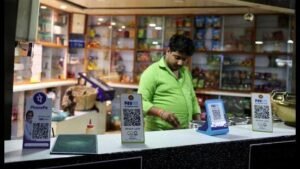
The Khirki branch of Delhi’s Community Library Project is filled with books for people of all ages, provides computers with internet for those who lack access at home, offers story time and literacy programs for children, and offers evening-hour operations to working people who need. a quiet place to read and work when homes are loud and crowded. Like many public libraries in the United States (US), Khirki also responds to material needs beyond the book, offering clean drinking water, washrooms, and even food — bananas in the morning, biscuits in the afternoon — to address the gap in access to basic human necessities produced by systematic and longstanding disinvestment in the people by the governments we elect.

All this good work is underpinned by a singular structural commitment — the library is free. It is free to use and free to join. Book borrowing is free. Computer use is free. Water and food are free. Anyone can walk through the gates into the vibrant courtyard and use the library. The Khirki community library serves the public. That public must include everyone if it is to live up to its purpose. When libraries charge fees, their use becomes restricted to the subset of people who can afford to pay. When libraries limit use by gender, race, class, religion or caste, they cannot, in any meaningful sense, be called public. When libraries are impossible to access due to distance or disrepair, only the people who live nearby, and who can afford transit fares, are served. In each case, a public good — the library — is privatized, limiting its use only to those who can afford it.
When we call a library public, we mean that the library belongs to the people, all of the people. If it is to belong to all of the people, particularly and especially in the context of economic inequality and other forms of discrimination, the public library must be free. Any imposed cost is an exclusionary barrier.
Appeals to charge fees take two forms. First, some argue that libraries are expensive, and, therefore, users must contribute to the funding of these institutions. It is true that libraries have costs, from the buildings and land they occupy to the book and journal collections that only get costlier as publishers consolidate across the United States (US) and Europe, extracting increasing profits from institutional and individual buyers. The question is who should pay these costs. Public goods are paid for with public money. We don’t ask individuals to cover the costs of parks or public schools. These are understood as things that benefit everyone; so, we pay for them through the public purse. Libraries should be no different.
Others argue that charging fees promotes personal responsibility. When we ask users to pay for library service, some say that they will take greater care of the books they borrow. Such an argument imagines that monetary exchange is what produces a sense of commitment to us and each other, when it is the opposite that is true. We value and care for what belongs to us, what we understand to be our own. Our children receive our best attention not because of what we pay for their food and clothing but because we see them as a part of who we are. The public library belongs to those who are invited and welcomed through their doors. If such libraries are to be valued by everyone, they must be open to everyone. This requires abolishing exclusionary measures, including fees for service.
Since the late 19th century, libraries in the US have enjoyed broad support for their public mission. Very few charge fees for service, and the vast majority work every day to expand their offerings to the public. In New Lebanon, New Hampshire, a library circulates garden beds each growing season and a seed library that ensures public access to food and flowers. In Donnelly, Idaho, a library circulates a cotton candy machine — an example of decommodification, the making public of a commonly private good — so that every child in this community that faces ever-deepening poverty can enjoy a birthday party. In Brooklyn, New York, libraries host monthly dinners for people returning from incarceration, providing free access not just to food but to fellowship.
But, as Angela Davis, the great American activist and author, reminds us, freedom is a constant struggle. Encroachments by capital threaten our ability to do our work. Our fundamental commitment to the public guides our organizing against these threats. The movement to protect and expand access to the public good must be a global one. At the heart of this struggle are the library workers whose daily labor expands access to reading and literacy, to quiet and well-lit spaces, to a sense of community and camaraderie that can be more and more difficult to access as our elected officials divide us. and then exploit those divisions for private profit.
As we work toward a future where all are meaningfully included in public life, the public library manifests that future in the present. Through those gates in Khirki and through the doors of my home library, the Windsor Terrace branch of the Brooklyn Public Library, we can find the world we want and the world we need, a world in which all of us and our libraries, are free .
Emily Drabinski is associate professor,Queens College, City University of New York.The views expressed are personal







